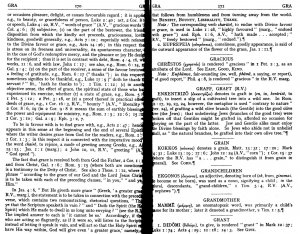Danthemailman
Well-Known Member
- Jul 18, 2017
- 3,703
- 2,813
- Country
- United States
- Faith
- Christian
- Marital Status
- Married
In James 2:21, notice closely that James does not say that Abraham's work of offering up Isaac resulted in God's accounting Abraham as righteous. The accounting of Abraham's faith as righteousness was made in Genesis 15:6, many years before his work of offering up Isaac recorded in Genesis 22. The work of Abraham did not have some kind of intrinsic merit to account him as righteous, but it showed or manifested the genuineness of his faith. This is the sense in which Abraham was "justified by works." He was "shown to be righteous."Don't be so quick to discount works.
James 2:
21 Was not Abraham our father justified by works when he offered Isaac his son on the altar? 22 Do you see that faith was working together with his works, and by works faith was made perfect? 23 And the Scripture was fulfilled which says, “Abraham believed God, and it was accounted to him for righteousness.” And he was called the friend of God. 24 You see then that a man is justified by works, and not by faith only.
25 Likewise, was not Rahab the harlot also justified by works when she received the messengers and sent them out another way?
26 For as the body without the spirit is dead, so faith without works is dead also.
In James 2:22, faith made perfect or complete by works means bring to maturity, carry to the end, to complete like love in 1 John 4:18. It doesn't mean that Abraham was finally saved based on merits of his works after he offered up Isaac on the altar in Genesis 22. When Abraham performed the good work in Genesis 22; he fulfilled the expectations created by the pronouncement of his faith in Genesis 15:6.
In James 2:23, the scripture was fulfilled in vindicating or demonstrating that Abraham believed God and was accounted as righteous. Abraham was accounted as righteous based on his faith (Genesis 15:6) not his works (Romans 4:2-3) long before he offered up Isaac on the altar in Genesis 22.
In James 2:24, James is not using the word "justified" to mean "accounted as righteous" but is "shown to be righteous." James is discussing the proof/evidence of faith (says-claims to have faith but has no works/I will show you my faith by my works - James 2:14-18), not the initial act of being accounted as righteous with God (Romans 4:2-3).
In the Strong's Exhaustive Concordance of the Bible, the Greek word for justified "dikaioo" #1344 is:
1. to render righteous or such he ought to be
2. to show, exhibit, evince, one to be righteous, such as he is and wishes himself to be considered
3. to declare, pronounce, one to be just, righteous, or such as he ought to be
In Matthew 12:37, we read - "For by your words you will be justified, and by your words you will be condemned." This is because our words (and our works) reveal the condition of our hearts. Words/works will be evidences for, or against a man's being in a state of righteousness.
God is said to have been justified by those who were baptized by John the Baptist (Luke 7:29). This act pronounced or declared God to be righteous. It did not make him righteous. The basis or ground for the pronouncement was the fact that God IS righteous. Notice that the NIV reads, "acknowledged that God's way was right.." The ESV reads, "they declared God just.." This is the sense in which God was "justified." He was "shown to be righteous."
Matthew 11:19 "The Son of Man came eating and drinking, and they say, 'Behold, a gluttonous man and a drunkard, a friend of tax-gatherers and sinners!' Yet wisdom is justified/vindicated/shown to be right by her deeds."
In James 2:25, Rahab believed in the Lord with authentic faith (Joshua 2:9-13), requested "kindness" (2:12), received the promise of kindness (2:14), and hung out the "scarlet line" (2:21), as the demonstration of her authentic faith. She showed that her faith in God was not a dead faith by her works, just as all genuine believers show theirs. (James 2:18)
In James 2:26, the comparison of the human spirit and faith converges around their modes of operation. The spirit (Greek pneuma) may also be translated "breath." As a breathless body emits no indication of life, so fruitless faith exhibits no indication of life. The source of the life in faith is not works; rather, life in faith is the source of works (Ephesians 2:5-10).
So man is saved through faith and not by works (Ephesians 2:8,9; Titus 3:5; 2 Timothy 1:9); yet genuine faith is vindicated, substantiated, evidenced by works (James 2:14-26).
*Christ saves us through faith based on the merits of His finished work of redemption "alone" and not based on the merits of our works.*
It is through faith "in Christ alone" (and not by the merits of our works) that we are justified on account of Christ (Romans 3:24; 5:1; 5:9); yet the faith that justifies is never alone (solitary, unfruitful, barren) if it is genuine (James 2:14-26). *Perfect Harmony*

Upvote
0

